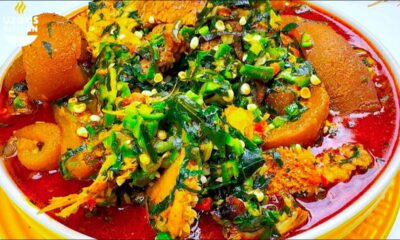Features
Busayo Oderinde: Much Ado About Seasoning Cubes
 “Have you put Maggi in the food?” “This food is not sweet; there is no Maggi in it” or “Where is the jar of Maggi?” These statements have been made by a lot of us at some point in our lives. No matter how posh you are, I have hardly heard anyone ask if someone has put seasoning cube or powder in the food. We all call it Maggi.
“Have you put Maggi in the food?” “This food is not sweet; there is no Maggi in it” or “Where is the jar of Maggi?” These statements have been made by a lot of us at some point in our lives. No matter how posh you are, I have hardly heard anyone ask if someone has put seasoning cube or powder in the food. We all call it Maggi.
We love our seasoning cube or bouillon cube or stock cubes. Most Nigerians and even Africans in general cannot do without seasoning cubes. Not that we can be blamed; we saw our mothers and grandmothers sef use them, we were taught to cook with seasoning cubes, that’s what we know. There is also this sense of incompleteness when you do not put seasoning cubes into your food. I know people who would rather put seasoning cubes in their meals and not put salt at all.
A typical seasoning cube contains salt, sugar, extracts of vegetables and natural spices and flavours or extracts of poultry, fish or beef and Monosodium glutamate known as MSG.
You all know there is some controversy when it comes to MSG. We have heard all sorts with the critics saying that MSG is bad. They also say MSG causes headaches, dizziness, nausea. I read an article on MSG and it asked why Asian people don’t have headaches since they are biggest consumers of MSG; I also wonder why all of us here don’t experience these symptoms. MSG is not bad, not one bit. Let me give a brief history.
MSG was discovered by a Japanese Professor called Professor Ikeda in 1909. He was also responsible for discovering the taste bud, “Umami”. MSG occurs naturally in food, it’s in meat, fish, cheeses, tomatoes, grapes and some vegetables, breast milk (this shocked me)and dried Kombu seaweed (this is how he discovered it); he found a way to extract and synthesize MSG. The receptors in our tongue for the taste UMAMI are the same ones that taste MSG. This is why his discovery of the two is very closely linked. Umami is a loanword from the Japanese which means “pleasant savoury taste”. Umami is not exactly salty or sugary or bitter or sour which are the classic biological taste buds, it is a robust combination of all with just a little more. Nigerian food is very rich in UMAMI by the way.
Also, Professor Ikeda was the Creator of Ajinomoto; he started the company in partnership with the Suzuki brothers. Ajinomoto means “Essence of taste”. In Asia, Ajinomoto is the real deal. By itself the crystalline salt like element doesn’t taste particularly good but put it in food and magic happens.
Now I don’t know where the urban legends came from, that seasoning powders like Ajinomoto or Vedan, because their main ingredient is MSG, can bleach your clothes so therefore it will wash your stomach. It became a thing and it seriously affected these brands and people’s perception of it and they lost good business. Who knows if it was started by their competitors? Just wondering….
All the seasoning cubes/powders have MSG, ALL OF THEM. They might write it under different names like monopotassium glutamate, glutavene, glutacyl, glutamic acid, autolyzed yeast extract, calcium caseinate, sodium caseinate, E621 (E620-625)etc. They are all MSG.
Whether you have a grouse with MSG or not; seasoning cubes are here to stay. The seasoning cube sector in Nigeria is HUUUUGE; the number threw me for a loop at first before I sat down to think about it. It is worth Fourteen trillion Naira -that’s about Seventy billion Dollars. That’s the annual GDP of some small countries.
You don’t believe it? Well let’s do a simple maths: the least amount you can get a seasoning cube at retail value is three Naira, the premium ones like Onga, Maggi and Knorr go for Ten Naira. Now we are about one hundred and seventy million people right? Let’s say One hundred and Fifty million people cook using one cube daily using the three naira one as a standard; that is Four hundred and fifty million Naira every day, multiplied by 365 days is a whopping One hundred and sixty five billion Naira.
Note that this is a very modest calculation, this is excluding parties, commercial cooking and people who eat at least twice a day and use about three or four cubes in their cooking or only the premium brands. Then you begin the idea on to get just how profitable this sector is. It’s no wonder so many Asian Manufacturers, are trying to enter the market there are so many brands in the market now. By the way, numbers like this make me excited about on my food entrepreneurial journey.
If these many critics of MSG feel very strongly about their cause, then I don’t see why they can’t invent an alternative “healthy”, non-synthesized option that would give our meals that extra oomph, I think there is a market for it. Right?
Personally, I think we could do without seasoning cubes if we want; it’s an acquired taste, a habit, a lifestyle that is so much a part of us. The truth is that there are alternatives to using them, I guess we are just lazy. It’s just a shortcut we don’t like to do without. My dad doesn’t get why we use so much seasoning cubes in our soups. He tells us to use salt, lots of onions and locust beans to cook soups for him. So far, it didn’t work; we reverted back to our old ways. We just love our “Maggi”.
There are alternatives to seasoning cubes. You could use a lot of natural spices like onions, garlic, ginger, curry, coriander, celery, thyme, basil, bay leaf, oregano, cumin, different kinds of peppers and so many more. Also learn to cook with less water. It’s really simple. If you steam meat using only salt, garlic, ginger onions, some thyme and curry and very little water, it will be tasty.
A new crop of nutritionists have come out to tell us that we lose so much nutrient from food and its natural taste because we flood our foods with water.
You could also make your own stock. Now for someone like me, I see this as serious long thing. A stock takes about one to three hours to cook. You could use so many things for your stock, different parts of meat, meat bones, vegetables, onions, some red wine; it depends on the flavour profile you are looking for. Be as creative as possible, this can be frozen and used for up to three months.
There is a seasoning component from the eastern part of Nigeria. I saw it once on a cooking show and it is like a small ball that is said to impart flavour and saltiness into your soups, the longer it stays in your soup, the more flavourful the soup gets. I don t know the name but I will appreciate someone schooling me. This could be our own natural MSG.
What are your thoughts? Please feel free to share and suggest or educate. Have a great weekend, Love and chocolates.
Photo Credit: Dreamstime | Darren Baker






















